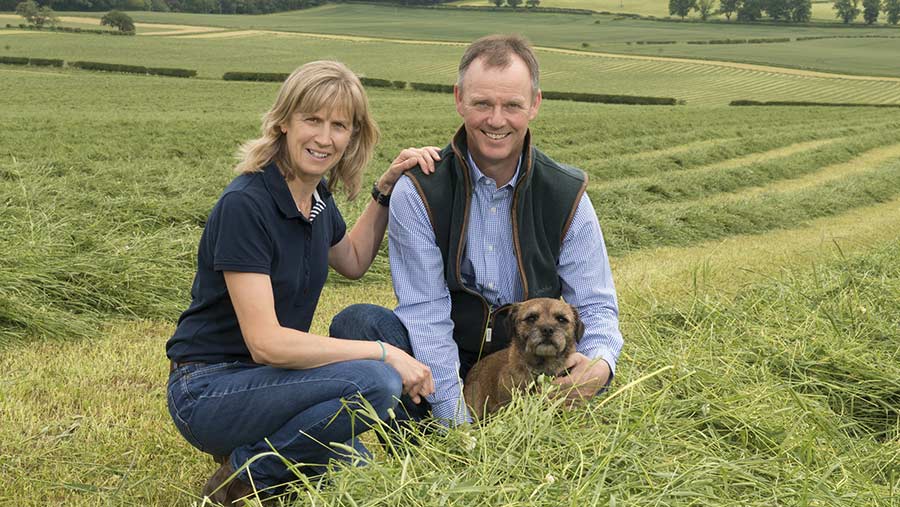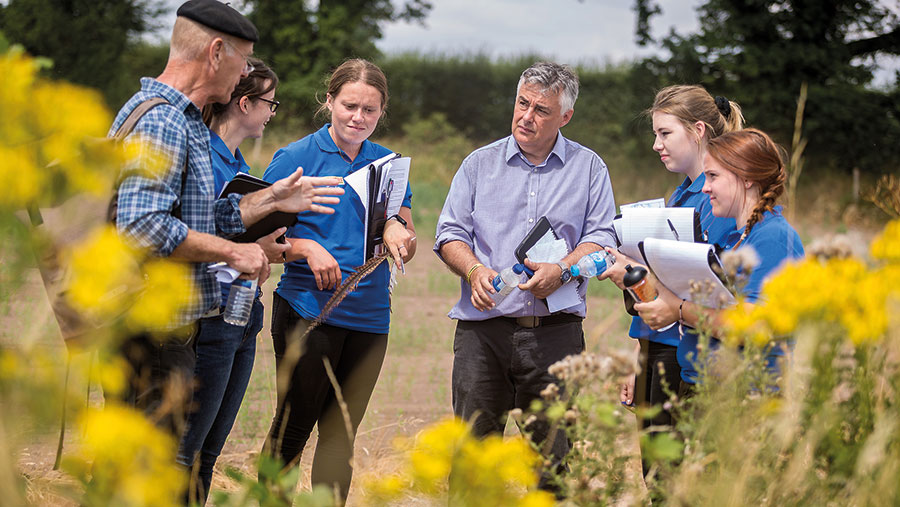Farmers Apprentice first as bootcamp goes on farm
 Robert and Jacqueline Neill operate cereals, grass and beef enterprises at Upper Nisbet Farm, Jedburgh. ©Angus Findlay
Robert and Jacqueline Neill operate cereals, grass and beef enterprises at Upper Nisbet Farm, Jedburgh. ©Angus Findlay Leadership skills, common sense and passion are just three of the attributes that top farmer Robert Neill will be looking for in this year’s Farmers Apprentice finalists.
The shortlisted contestants will face a series of practical and theoretical challenges at his Roxburghshire arable and beef unit, which will host bootcamp between 23 and 28 August.
See also: What we learned from being part of Farmers Apprentice
“Leadership is about being able to make decisions, but it also means that if you have experience you should help and guide those around you by sharing your knowledge and imparting your skills,” says Robert.
“This is important in real-world situations, so we’ll certainly be looking for it at bootcamp.
“Successful people don’t try to be the loudest and they know they’re not always necessarily the best, but they support others and understand that in most endeavours you have to work as part of a team.”
On-farm first
This is the first year that bootcamp will be held on a farm, rather than at an agricultural college, allowing for a rejigged format and reduced physical interaction between contestants, judges and sponsors in line with Covid-19 social distancing guidelines.
What is Farmers Apprentice?
It is a competition open to all ambitious 18- to 25-year-olds, who want to pursue a career in farming, food or any of the ancillary industries. Farmers Weekly partners with leading companies to run the initiative which awards a prize of £10,000 to the winner to spend on furthering their agricultural education or business.
The event will still be an intense five days for the young men and women who have made it to this stage, giving them a chance to see a world-class farm first-hand with Robert and Jacqueline Neill operating cereals, grass and beef enterprises at Upper Nisbet Farm, Jedburgh.
“The attributes I want to see in our would-be apprentices are exactly those I’d be looking for if someone knocked at my door asking for a job,” says Robert.
“They need a lot of common sense because I sometimes fear this quality is being bred out of the human race!
“Versatility is also key. Especially on smaller, family, mixed farms, team members need to be able to turn their hand to a variety of tasks.”
Another attribute valued by Robert, who was named Farmers Weekly’s Farmer of the Year in 2017, is passion for the industry.
“You need to have the drive to want to get up every morning and get on. Farming is hard at times and there’ll always be setbacks, so you can’t let them get to you.
“You have to develop a mindset where you bounce back, don’t take things personally, learn from your mistakes and constantly seek to acquire new skills.
“I value communication, too. A good communicator speaks a lot – they share information and ideas, plans, objectives, hopes and fears. However, as well as talking, listening is important too.”

Farmers Weekly editor Karl Schneider (centre) at the 2018 Farmers Apprentice bootcamp. © Richard Stanton
Technology know-how
The high-tech, global nature of the farming sector means no one person can be an expert on everything, so when you don’t know something, you have to be prepared to ask someone who does, believes Robert.
“Having a willingness to take advice and learn new skills is crucial, as farming enters a period of dramatic change. Young people – all of us, in fact – have to be open to new ideas.”
According to Farmers Weekly editor and Farmers Apprentice judge Karl Schneider, in this fast-changing world it is the ability to deal with unexpected events that often sets the best farmers apart from the rest.
“The skill set you need in this sector is incredibly broad, so you can’t be brilliant at all of them, but you do have to not be fazed by taking on tasks that arise unexpectedly or that take you outside your comfort zone.
“If you’re running a farm, you need all the skills you would for running any other small- to medium-sized business, but on top of that there are all the technical, digital, mechanical, animal husbandry and agronomy skills.
“Standing still won’t be an option in agriculture, so farmers are going to need to be able to change – and it’s important to do this in a structured, thought-through way.”
The bootcamp exercises, designed to reflect real-world scenarios, will rigorously test finalists in this respect. “I want to see contestants take a logical, systematic approach – to look at the situation they’re in and make decisions based on the best evidence they’ve got.”
Wanted: Business brains
To make the best decisions, farmers need to understand which of the available approaches and technologies are most appropriate for them – and to do this well, they need to properly understand their businesses, adds Karl.
“Many already do take a hard, self-critical look at themselves, but there is still scope for improvement in many situations.
“Farmers need to get on top of all the numbers, so they know exactly where they’re doing better or worse than their peers in terms of, for instance, controlling costs.
“If you don’t have that data at your fingertips, you won’t know which areas you need to change to make the biggest difference.
“Bootcamp really pushes the apprentice finalists and helps them get a better insight into their own strengths and weaknesses,” he adds. “It’s also a great networking experience and a chance to build their profile.”
As for his final bit of advice for the 10 rising stars who’ll be battling it out in a bid to take home this prestigious title?
“You need to throw yourself into the experience. I don’t want to see anyone hanging back and not contributing.
“That doesn’t mean you have to constantly interrupt or try to make your voice heard above everybody else’s, but don’t sit back and let other people do the work.
“You can’t be part committed – you have to show you’ve got skin in the game.
“If you’re tired and have had a long day, that’s when the temptation to take your foot off the pedal might arise, but that’s when we want people to really roll up their sleeves and get going.
“That’s when you see the difference between those who have really got what it takes and those who haven’t.”
Learning curve
Back in Roxburghshire, Robert is also looking forward to welcoming the group of ambitious youngsters to Upper Nisbet Farm.
“I’ll enjoy it hugely and I’ll learn a lot from the contestants, too. You’re never too old to learn in agriculture. Every day is a school day.
“The next generation is the future so it’s vital we engage with them and the Farmers Apprentice competition is a fantastic way of doing that.
“Farming still isn’t always seen as the most exciting of careers so we need to change that by highlighting what’s good about it.
“We need to promote it so those at school, college and university see it as an important, dynamic and fulfilling career.
“What other job is there, after all, that gives you the chance to work outdoors, have a healthy way of life, feed the nation, do great things for the environment, plus look after livestock and grow wonderful crops.”
The bootcamp experience
Bootcamp will test the finalists to the limit through a series of practical, technical and business challenges.
Previously held at agricultural colleges, this year we’re giving finalists the chance to spend time on a top Roxburghshire farm from 23-28 August, with all involved adhering strictly to government coronavirus advice and guidelines.
See farmersapprentice.co.uk to find out more about the competition, and keep up with the latest from bootcamp on Twitter @farmersweekly #farmersapprentice





